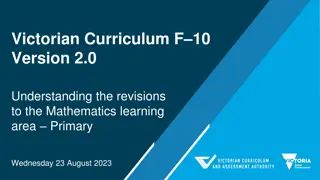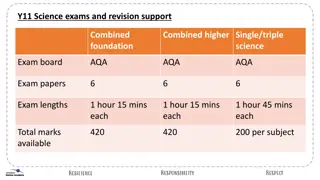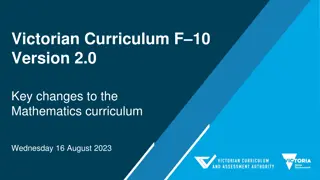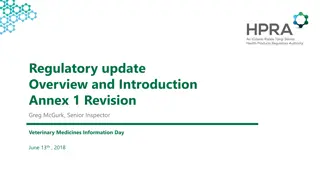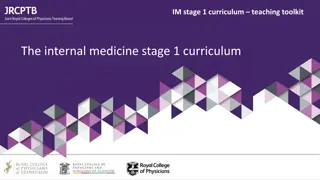Curriculum Development and Revision Policy at University of Kelaniya
This policy aims to guide the development and revision of degree program curricula at the Faculty of Commerce and Management Studies, University of Kelaniya. It focuses on ensuring quality, timely reviews, assessing program goals, obtaining resources, and aligning with national education policies. The policy outlines requirements for major and minor curriculum revisions, as well as the process for developing new curricula.
- Curriculum Development
- Revision Policy
- University of Kelaniya
- Faculty of Commerce
- Management Studies
Download Presentation

Please find below an Image/Link to download the presentation.
The content on the website is provided AS IS for your information and personal use only. It may not be sold, licensed, or shared on other websites without obtaining consent from the author. Download presentation by click this link. If you encounter any issues during the download, it is possible that the publisher has removed the file from their server.
E N D
Presentation Transcript
Curriculum Development and Revision Policy Faculty of Commerce and Management Studies, University of Kelaniya
Aims of the Policy To establish a clear philosophy and goals that guide developing and revising the curriculum of the degree programs of the faculty. To contribute to the assurance and enhancement of the quality of curricula at the Faculty of Commerce and Management Studies. To ensure the time frame for regular curriculum reviews and/or new curriculum developments with changing disciplinary, educational, and social circumstances. To suggest met hods of assessing the achievement of the program's goals and objectives. To provide direction for obtaining human, material, and financial resources to implement the program. To provide a guide to identify and develop a curriculum with the needs of national higher education policies and frameworks.
Requirements for Curriculum Revision Major Revisions Approval of UGC is needed. Changes to the number of academic years required for the study program. Changes to SLQF qualification type with designators and qualifiers Changes to SLQF exit level. Adding or removing lateral entry and early exit possibilities. Introduction of a specialization/majoring area in an existing degree program 6Deleting or substituting one or more specialization / major or minor areas in an existing degree program.
Requirements for Curriculum Revision Minor Revision: Minor changes should be undertaken at the Departmental level and finally must receive approval from the Academic Senate and the University Council. 1. Revisions to Assessment Criteria 2. Changes to course units Course code and title Content Credit value Semester etc
New Curriculum Development Process Phase 1: Identification of the need of the proposed curriculum for the new degree program Phase 2: Action for the curriculum development- Stakeholder Phase 3: Develop the Graduate Profile and Programme Learning Outcomes (PLOs) for the proposed degree program Phase 4: Identification of course pillars and credit values Phase 5: Identify the progression of the course unit under each sub-pillar from level 1 to level 4. Phase 6: Identify the Intended Learning Outcomes (ILOs) for each course unit Phase 7: After identifying the ILOs for each course unit, the notional hours for each course unit should be determined Phase 8: Development of course units Phase 9: Finalization for approval
Composition of Duties and Responsibilities of the Curriculum Development and Revision Committee Curriculum Development and Revision Committee - with the policy development guidelines. Committee members shall be represented by lecturers from the respective departments. The composition of the committee is as follows; a minimum of two professors, and lecturers of the respective discipline. Members of the committee are responsible for designing and reviewing curricula in line Head of the Department -The head of the department shall have the leadership and authority to guide academic staff in relation to curriculum development and decision processes and take responsibility for the revision that takes place within the department. He/she should appoint a chair and members to the curriculum revision committee and, must ensure that the committee is designing and reviewing curricula in line with the policy development guidelines. Management Committee of the Faculty (Faculty Quality Assurance Cell (FQAC) the faculty, university, and UGC/CQA guidelines. FQAC shall forward the documents with their recommendations to the Dean to be tabled at the Faculty Board. FQAC should carry out required checking on conformity to Faculty Board - Members of the faculty board are required to review the developed or revised curriculum and provide comments. Centre for Quality Assurance (CQA) - CQA is required to provide the recommendation with the completed checklist. Curriculum Teaching and Evaluation Committee (CULTEC)- document to the next level. CULTEC should carry the required checking and should approve the University Senate- recommendations. It is required to appoint relevant reviewers, send the developed curriculum to the reviewers, and provide University Council- It is required to provide the approval for the developed /revised curriculum. Quality Assurance Council in University Grants Commission- Provide the approval for the compiled document prepared as per the UGC format
Monitoring and Evaluation of the Curriculum At the end of each semester, evaluation should be done at the department level under the supervision of the head of the department. If there is any issue with the evaluation outcomes, the reasons should be identified, and necessary actions should be taken. (Internal mechanism to regularly monitor and annually review).









